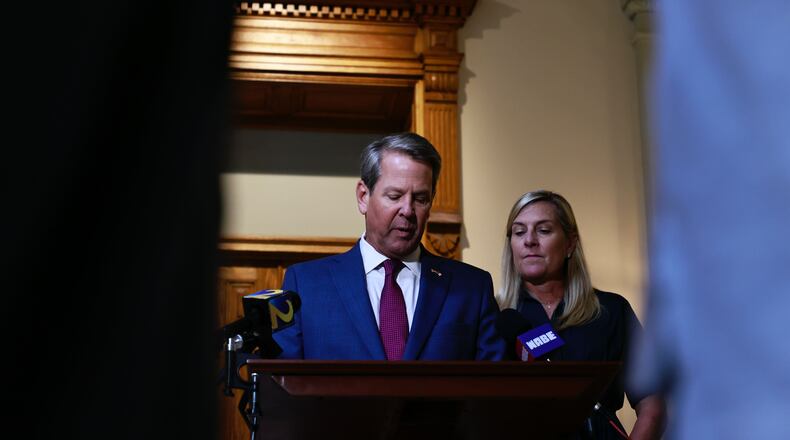The U.S. Supreme Court opinion that overturned Roe v. Wade hasn’t led to the game-changing political shakeup that Democrats expected and Republicans feared, though the landscape could shift with a ruling that allows Georgia’s anti-abortion law to take effect.
With less than four months ahead of the November election, it’s impossible to predict how the federal appeals court’s decision Wednesday that paves the way for new abortion restrictions will factor into an election featuring every statewide office and a U.S. Senate seat.
But polls of Georgia voters so far indicate that concerns about the Supreme Court decision eliminating the constitutional right to abortion that’s been in place for nearly a half-century has taken a backseat to economic issues such as rising inflation and high energy prices.
Democratic candidates are leaning into economic issues as much — or perhaps more — than any other. Even as gubernatorial candidate Stacey Abrams promises to repeal anti-abortion laws, she’s vowed to deliver a $1 billion tax refund to Georgians and suspend state gas taxes through the year.
And while U.S. Sen. Raphael Warnock supports rolling back Senate filibuster rules to codify federal abortion protections, his campaign message is peppered with pushes to curb prescription drug prices, enact a federal gas tax break and punish price-gougers.
A Georgia AARP poll of likely voters that was released last week provided the latest example of how the impact of the Supreme Court’s ruling and the fallout in Georgia remains uncertain.
The poll, conducted by President Joe Biden’s pollster, found that just one-third of Georgians say the economy is working for them and that 40% indicated inflation or pocketbook issues were their most important concern. About 11% indicated that abortion was the most important factor.
“The people who were most upset about the Supreme Court’s decision were already voting Democrat, and the people who were most excited were Republican,” said Martha Zoller, a conservative commentator and anti-abortion activist. “It’s just not overtaking economy as the most important issue.”
Already facing a tough political climate, Democrats predict that the federal court’s ruling will refocus attention on Republican-backed legislation that would prohibit most abortions as early as six weeks.
“They’ve essentially rendered us second-class citizens,” said Democratic state Rep. Shea Roberts of Atlanta. “And it will have an economic fallout as it relates to health care, as it relates to forcing women to have babies if they’re not ready to.”
She added: “The economy needs to be addressed, but our fundamental rights also need to be addressed.”
Credit: arvin.temkar@ajc.com
Credit: arvin.temkar@ajc.com
Abrams vowed to do everything in her power to reverse the anti-abortion law if she wins office — and she warned that Republican Gov. Brian Kemp could act with “impunity” in a second term and seek an outright ban on the procedure.
“I’m not certain if the governor failed biology or simply failed morality but either way this law is wrong and it must be struck down,” she said at a press conference that drew other high-profile party leaders.
“There will be those who say I’m impassioned, some who might say I’m angry,” she said, pausing for a beat. “I am enraged.”
‘Raise the stakes’
The 11th U.S. Circuit Court of Appeals’ ruling cleared the way for Georgia’s 2019 law to go forward and rejected arguments challenging a “personhood” amendment that gives a fetus the same legal rights people have after birth. It left it to a lower court to reverse its decision.
The new law bans abortion after a doctor detects fetal cardiac activity except in cases of rape, incest, if the life of the woman is in danger or in instances of “medical futility.”
Top Republicans on Wednesday took a muted victory lap.
The governor, who once boasted the state’s anti-abortion law was the nation’s “toughest,” said Wednesday that he was “overjoyed” that the court’s ruling paved the way for the implementation of the law. But he also quickly touted a new program to help hire veterans at a battery factory.
Credit: Miguel Martinez
Credit: Miguel Martinez
And at a stop in Athens, Republican U.S. Senate hopeful Herschel Walker, who supports a total ban on abortion, dodged questions about whether he’d support federal legislation to outlaw the procedure across the nation.
“That’s an ‘if,’ and I think that’s what we don’t need to worry about,” he said.
There’s good reason for the GOP to tread warily around the issue.
They’re eager to tie Democrats to Biden’s falling approval ratings and want to focus attention on soaring prices for fuel, food and household products. Annual inflation in metro Atlanta has climbed into double digits, squeezing households already struggling with economic uncertainty.
“Even voters singularly focused on abortion aren’t going to want to hear about it every day until Nov. 8. They can’t,” said Brent Buchanan, Kemp’s pollster. “That’s the only rallying cry Democrats have, and they’ve already gotten all the juice they’re going to get out of that squeeze.”
Democrats are ready to test that theory. Roberts, who has shared a deeply personal story about how she had an abortion 15 years ago, said opponents of the new law will be jolted into action when it takes effect.
“This raises the stakes even more in Georgia, because we could have a chance to stop it if Stacey Abrams is governor,” she said.
About the Author
Keep Reading
The Latest
Featured




